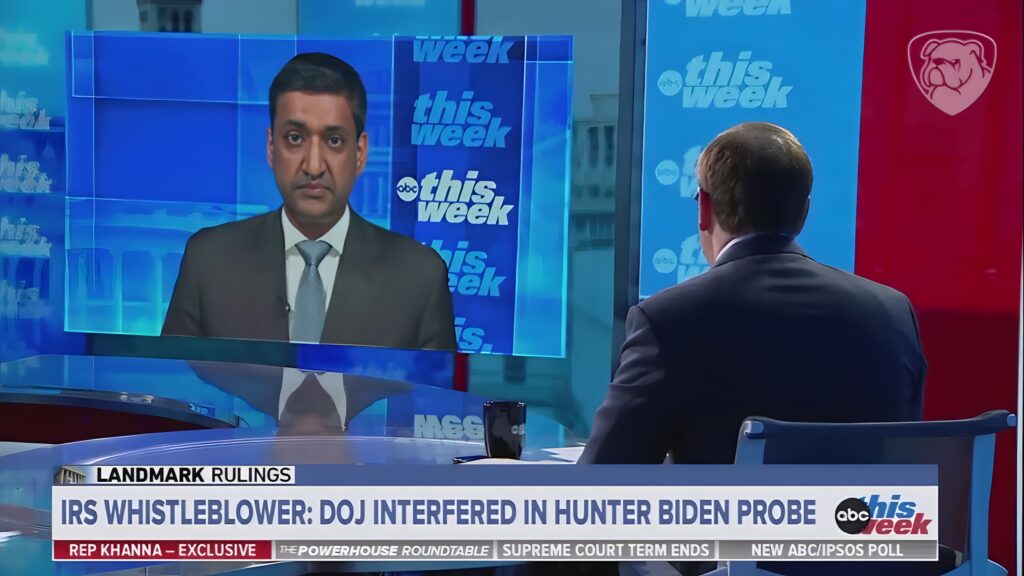In a surprising twist, ABC’s Jon Karl cornered Democrat Representative Ro Khanna with a potent question about the IRS whistleblower’s explosive claims. The whistleblower alleges Attorney General Merrick Garland interfered in the probe into Hunter Biden, contradicting Garland’s previous assertions. The question, dropping like a bombshell during Sunday’s interview, left viewers and Khanna in suspense. This unexpected deviation from traditional soft-ball questions heralds a shift in journalistic inquiry. Karl’s audacious move has undoubtedly stoked the embers of a controversy that threatens to engulf Garland and the Biden administration.
This is a shocker! Jon Karl ends his friendly interview with Democrat Congressman Ro Khanna by asking him about the IRS whistleblower report revealing AG Merrick Garland lied to congress about not interfering in the Hunter Biden investigation. pic.twitter.com/SWKQzIvzZC
— Kevin Tober (@KevinTober94) July 2, 2023
The allegation, brought forward by an IRS whistleblower, exposes a potential overreach of power at the highest echelons of justice. The question of Merrick Garland’s involvement in the Hunter Biden investigation raises concerns about the autonomy and integrity of judicial proceedings. While the Attorney General’s office has categorically denied these allegations, the growing cacophony of the controversy refuses to die down. This recent development throws a wrench into the machinery of the Biden administration, which prides itself on transparency and justice.
The whistleblower’s testimony, as discussed by Republicans in the House, presents an unsettling picture. It suggests that the US Attorney in Delaware was not the sole decision-maker in this case. Instead, the decision-making power allegedly rested with Garland, contradicting his previous assurances. It also contradicts Khanna’s claim that US Attorney Weiss had “total power” over Hunter Biden’s case.
In an attempt to clarify the situation, Jon Karl pushed Ro Khanna further, pointing out the crux of the whistleblower’s claims. “But what the whistleblower is saying is that Weiss, who was appointed by Trump, said that he was not the deciding official on this case. If that turns out to be true, doesn’t that directly contradict what the Attorney General has said?” Karl asked.
The Congressman replied, “Weiss was not saying that. If Weiss was saying that, I would have a concern.” But the question remains: Is Ro Khanna misrepresenting the facts, or is he merely caught in the maelstrom of these shocking revelations?
Weiss confirmed that his charging authority was confined to his home district in Delaware. Any requirement to bring charges in another venue would necessitate contact with the US Attorney’s Office for the district in question.
What’s concerning is that, according to the whistleblower’s testimony, the US Attorneys in California and DC, both appointed by Joe Biden, may have hindered Weiss from bringing charges against Hunter Biden. If these allegations are proven true, they can significantly undermine the credibility of the Biden administration, which has long promised a clean and transparent government.
The spotlight on this issue comes at a time when faith in governmental institutions is wavering. If the allegations of Garland’s interference are substantiated, it could lead to an erosion of public trust in the judiciary’s independence. This would not only impact the Biden administration but also raise pertinent questions about the exercise of power within the system of justice.
This controversy raises serious questions about the broader implications for the functioning of our institutions. In a democracy, ensuring that the institutions that safeguard our liberties and rights are not subject to political interference is of paramount importance. As the allegations fly, the need for an in-depth investigation into these claims becomes even more urgent.
The discourse around the issue has sparked a wider debate about accountability, integrity, and the need for transparency in our government. ABC’s Jon Karl’s decision to question Ro Khanna on this issue underscores the pressing need for journalistic rigor and responsibility.
In the public eye, the controversy has shifted the focus away from the Biden administration’s policy agenda. As the debate intensifies, the administration is being forced to answer uncomfortable questions about its commitment to transparency and the rule of law.
Jon Karl’s pointed question represents a seismic shift in the political discourse around the issue. It signifies a new era of rigorous scrutiny and bold journalistic inquiry. It brings the discussion of the IRS whistleblower’s allegations against Merrick Garland from the sidelines to center stage, opening a Pandora’s box of debate about the integrity of our judicial system.
As the dust settles on Jon Karl’s interview with Ro Khanna, the revelations underscore a period of uncertainty and scrutiny for the Biden administration. The unearthing of these allegations demands a rigorous investigation to restore faith in our justice system. The road ahead may be turbulent, but the truth is indispensable for our democracy’s health. For now, Karl’s unexpected question has left a striking imprint on the political landscape, shaking the status quo and propelling this issue to the forefront of national conversation. Amidst the ensuing storm, one thing is clear – the American people deserve nothing short of transparency and accountability.



